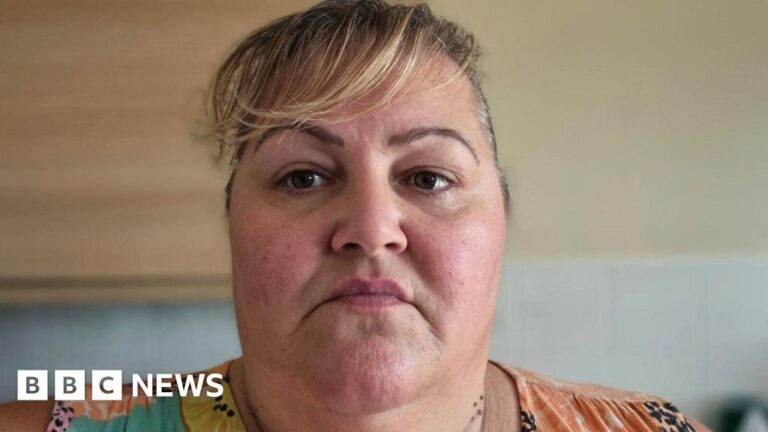Image source, Leanne Morgan
- author, Kate Morgan
- role, BBC Wales News Community Correspondent
Activists argue that Gypsy, Roma and Traveller communities should be treated as voters during elections and “not treated as political balls”.
The Traveller Movement added that these communities face “chronic democratic under-representation”.
Leanne Morgan, 48, a member of the gypsy community, said people like her just wanted to be treated “like everyone else”.
The Electoral Commission is backing a campaign to encourage more members of the Gypsy, Roma and Traveller communities to vote, as they are “lower chance” of being registered to vote.
The mother of two said there are many barriers her community faces, leaving many feeling like “second-class citizens.”
“There’s only a limited time you can stand up and fight for what you want,” she added.
Leanne, who lives with her family on the estate in south Pembrokeshire, said politicians do not visit estates during election campaigns.
“I think they forget that they are voters too, so historically, Gypsy and Traveller settlements have been out of the way and pushed aside.”
“Unless you’ve lived in the area a long time, you wouldn’t even know they were there,” she said.
There are approximately 3,630 Gypsies and Irish Travellers living in Wales, with the highest proportions in Cardiff and Pembrokeshire.
According to the latest census in 2021, 73% live in houses or apartments, and 27% live in caravans or mobile homes.
Political rhetoric and language also create barriers, according to LeAnn.
She works with officials on behalf of her community and says political leaders and activists use too much jargon.
“I think they need to consider how they are speaking to the people who are going to put them in power so that they understand and everything is properly explained,” she said.
Grace Preston is one of the driving forces behind Operation Traveller Vote, an initiative to ensure members of the Gypsy, Roma and Traveller communities can vote in the upcoming elections.
“The community members do not feel like voters but as political balls being dragged out for politicians’ election campaigns,” the senior policy official added.
Traveller Movement, the group behind the campaign, said people from these communities face “chronic democratic under-representation and huge levels of discrimination”.
Image source, Grace Preston
“If you don’t feel like you’re an active member of the community, you disengage and you don’t get involved. Our job is to show you how you can vote and use your voice,” she added.
Alongside the campaign, the Traveller movement has produced its own manifesto proposing ways for all political parties to prioritise the needs of the community in areas such as health and education.
The group travels to UK cities and visits tourist hubs to help them overcome reading, writing and digital literacy challenges.
“We have our own manifesto, we have questions that people should ask their politicians… giving people the power to speak up for themselves is really important,” she said.
The campaign is backed by the Electoral Commission, an independent body that monitors elections.
“Everyone should be able to take part in elections, but our research shows that some groups, such as Gypsy, Roma and Traveller communities, are less likely to be registered to vote or to have recognised identity documents,” the spokesman added.
What do the parties say?
Pride Kamri said: “Roma, [Gypsy]The Roma and Irish Traveller communities are too often used as political tools.”
“We are committed to fighting Islamophobia, anti-Semitism, anti-migrant sentiment, anti-Gypsy and Roma Traveller sentiment, as well as all forms of racism and prejudice in politics and society at large,” the spokesman added.
The party said politicians from all parties have a duty to engage with all communities in their local areas and encourage everyone to take part in elections.
Both the Labour and Conservative parties were approached for comment.

